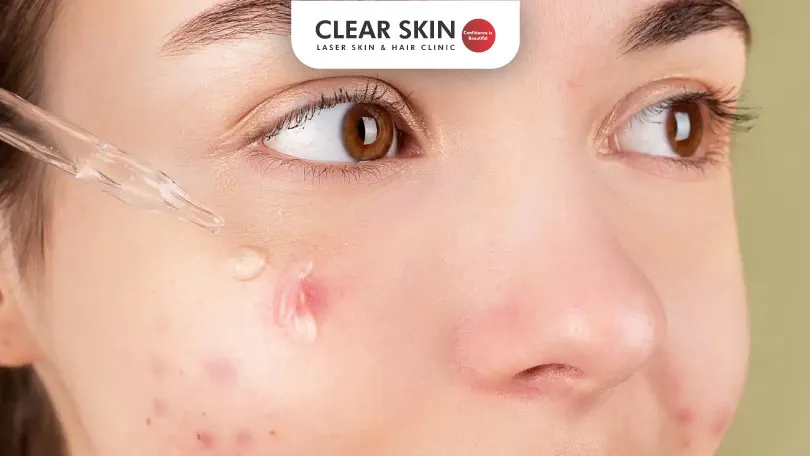Best Serums for Acne-Prone Skin: Expert Tips

Written by Clear Skin Content Team | Medically Reviewed by Dr. Dhanraj Chavan on October 02, 2023

Acne is a pervasive skin condition that affects millions worldwide. As the condition is common and frequent in individuals, especially young adults. As a leading acne clinic, we regularly get queries related to this condition.
A lot of people ask us about the best serum for Acne. People also ask what ingredients should be there in the best acne serum. So we decided to come up with a detailed blog to help patients get their answers. So let’s get started.
Table Of Content
- What is Acne Prone Skin?
- The Causes of Acne Prone Skin
- Effective Acne Management
- Key Ingredients in Acne-Fighting Serums
- How to Use a Face Serum for Acne Prone Skin?
- Conclusion
What is Acne Prone Skin?
Acne-prone skin is characterized by the persistent occurrence of acne, which can be triggered by hormonal changes, makeup, or even slight alterations in your skincare regimen. If your skin erupts into acne with minor provocations, you likely have Acne-prone skin.
This contrasts significantly with individuals who rarely experience breakouts, regardless of their skincare routine or lifestyle. Oily skin, in particular, is more susceptible to acne due to excess sebum production, making proper care crucial for those with this skin type.
Best Serum for Acne Prone Skin | Top 5 ingredients जो Acne Serum में होनी चाहिए | Dr Dhanraj Chavan
The Causes of Acne Prone Skin
There are numerous reasons that can lead to acne. Here are some primary causes:
Sebaceous Glands and Oil Production:
These glands are responsible for secreting oil (sebum) to keep the skin moisturized. However, when they produce too much oil, it can lead to clogged pores.
Dead Skin Cells:
The skin constantly renews itself, shedding dead cells. If these cells don’t slough off effectively, they can accumulate and mix with excess sebum, clogging pores.
Bacterial Growth:
The clogged pore creates an ideal, oxygen-deprived environment for bacteria, particularly Propionibacterium acnes (P. acnes), to thrive. This bacterial growth can cause inflammation and worsen acne.
Hormonal Fluctuations:
Hormones can significantly impact oil production. Increases in androgens, for instance, can lead to enlarged sebaceous glands and more oil, exacerbating acne conditions.
Inflammation:
The immune system’s response to clogged pores and bacteria can lead to inflammation, resulting in the red, swollen appearance of acne lesions.
Effective Acne Management
Controlling acne involves a multifaceted approach, including the use of suitable cleansers, serums, and topical medications. It’s essential to follow a Skincare Routine tailored to reduce sebum production, promote skin cell turnover, and minimize bacterial growth. Addressing these factors can significantly reduce the incidence of acne.
Key Ingredients in Acne-Fighting Serums
Salicylic Acid: The Pore Penetrator
Salicylic acid stands out for its exceptional ability to dive deep into the pores and clear out the gunk. By dissolving dead skin cells and excess oil, it ensures that the pores are free from blockages that can lead to acne. Its oil-reducing capabilities make it a staple for those with oily skin types, prone to frequent breakouts.
Regular use of salicylic acid can lead to a noticeable reduction in pore size and a significant decrease in the formation of both Blackheads and Whiteheads.
Retinol: The Skin Renewer
Retinol, a derivative of vitamin A, is celebrated for its profound impact on skin health. Its dual action of promoting skin renewal while possessing anti-inflammatory properties makes it a holistic treatment for acne. By accelerating skin cell turnover, retinol helps to prevent the clogging of pores while also reducing the appearance of fine lines and wrinkles.
Its anti-inflammatory benefits soothe the skin, reducing redness and swelling associated with acne breakouts. Incorporating retinol into your skincare regimen can lead to improved skin texture and tone, making it appear more vibrant and youthful.
Niacinamide: The Dual-Action Powerhouse
Niacinamide, also known as vitamin B3, is a multifaceted ingredient with anti-inflammatory and antibacterial properties. It plays a crucial role in reducing the growth of acne-causing bacteria on the skin’s surface, thereby minimizing the likelihood of breakouts.
Additionally, its anti-inflammatory effects help to calm irritated skin, reducing the redness and discomfort associated with acne. Niacinamide also regulates oil production, which can help prevent future acne flare-ups. Its versatility makes it an invaluable addition to acne-fighting serums, suitable for all skin types.
Alpha-Hydroxy Acids (AHAs): The Skin Brighteners
Alpha-Hydroxy Acids, including glycolic acid, malic acid, and azelaic acid, are known for their ability to promote skin turnover. By gently exfoliating the skin, AHAs remove dead skin cells, preventing them from clogging pores and forming acne.
Moreover, their capacity to fade post-acne pigmentation is a boon for those struggling with dark spots and uneven skin tone following acne breakouts. Regular use of AHAs can lead to smoother, brighter skin with a more even complexion, making them a must-have in acne treatment routines.
Benzoyl Peroxide: The Bacteria Buster
Benzoyl peroxide is a potent ingredient known for its ability to kill acne-causing bacteria, making it particularly effective for severe acne management. While it is more commonly found in face washes, its inclusion in serums can provide targeted treatment to problem areas.
Benzoyl peroxide works by introducing oxygen into the pores, which helps to kill the bacteria, as they cannot survive in an oxygen-rich environment. It also helps to remove dead skin cells and excess oil, further preventing acne. Its powerful antibacterial properties make it an essential component of acne treatment for those dealing with persistent breakouts.
How to Use a Face Serum for Acne Prone Skin?
To effectively use a face serum for acne, follow these simple steps. First, always start with a clean face. Choose a cleanser meant for acne-prone skin or a gentle face wash.
This prepares your skin to better absorb the serum. Immediately after washing and while your face is still slightly damp, apply the serum evenly across your skin. Applying it to damp skin boosts the serum’s ability to penetrate deeper, making it more effective.After applying the serum, don’t forget to moisturize.
In the morning, follow up with sunscreen to protect your skin from sun damage. At night, use a moisturizer to keep your skin hydrated. The type of serum you choose is crucial. It should fit the severity of your acne. Begin with applying the serum every other day.
This initial frequency allows you to monitor how your skin reacts to the new product. If your skin responds well and shows no signs of irritation, you can increase usage to every day.
The goal is to let your skin adjust gradually to the serum, reducing the chance of irritation. This approach, while simple, is effective in treating acne. Remember, consistency is key. With regular use, you should start seeing improvements in your acne. Patience and following these steps can lead to clearer, healthier skin over time.
Do You Know?
Roughly 250 Patients Are Treated
Everyday By These Dermatologists
(You are one click away from flawless skin)
Meet Our Dermatologist!
Conclusion
Acne management requires a careful selection of skincare products and a consistent routine. By understanding the causes of acne and incorporating serums with the right ingredients into your skincare regimen, you can significantly control and reduce acne outbreaks.
Remember, the key to combating acne lies in the balance of treating the existing conditions and preventing new breakouts. With the right approach, achieving clear, healthy skin is within reach.
This guide has been designed to offer a deep dive into understanding and managing acne-prone skin. But this is just for information purposes. Remember, the causes and effects of acne are unique to each individual. So the readers need to consult their physician before taking any action. Only a Certified Acne Expert can help you identify the causes and treat them efficiently.
Further Reading
How to Get Rid of Acne Scars Fast?
Safe acne scar treatment for Indian skin tones. Dermatologist-planned procedures to reduce scars and improve skin texture.
Does Pune’s Air Pollution Worsen Acne? Dermatologist Insights
Discover how Pune’s air pollution with PM2.5 levels 8.5x above safe limits worsens acne. Dr. Dhanraj Chavan shares dermatologist-approved protection strategies and treatment options.
Remove Black Dots on Nose Naturally | Skin Expert Tips
Learn how to remove black dots on your nose naturally. Explore effective home remedies and dermatologist tips for clear, smooth skin.
10 Effective Home Remedies to Remove Dark Spots on the Face Naturally
Do home remedies really remove dark spots on face? Understand what works, what doesn’t, and when to see a dermatologist for pigmentation.
Have thoughts? Please let us know
We are committed not only to treating you, but also educating you.





